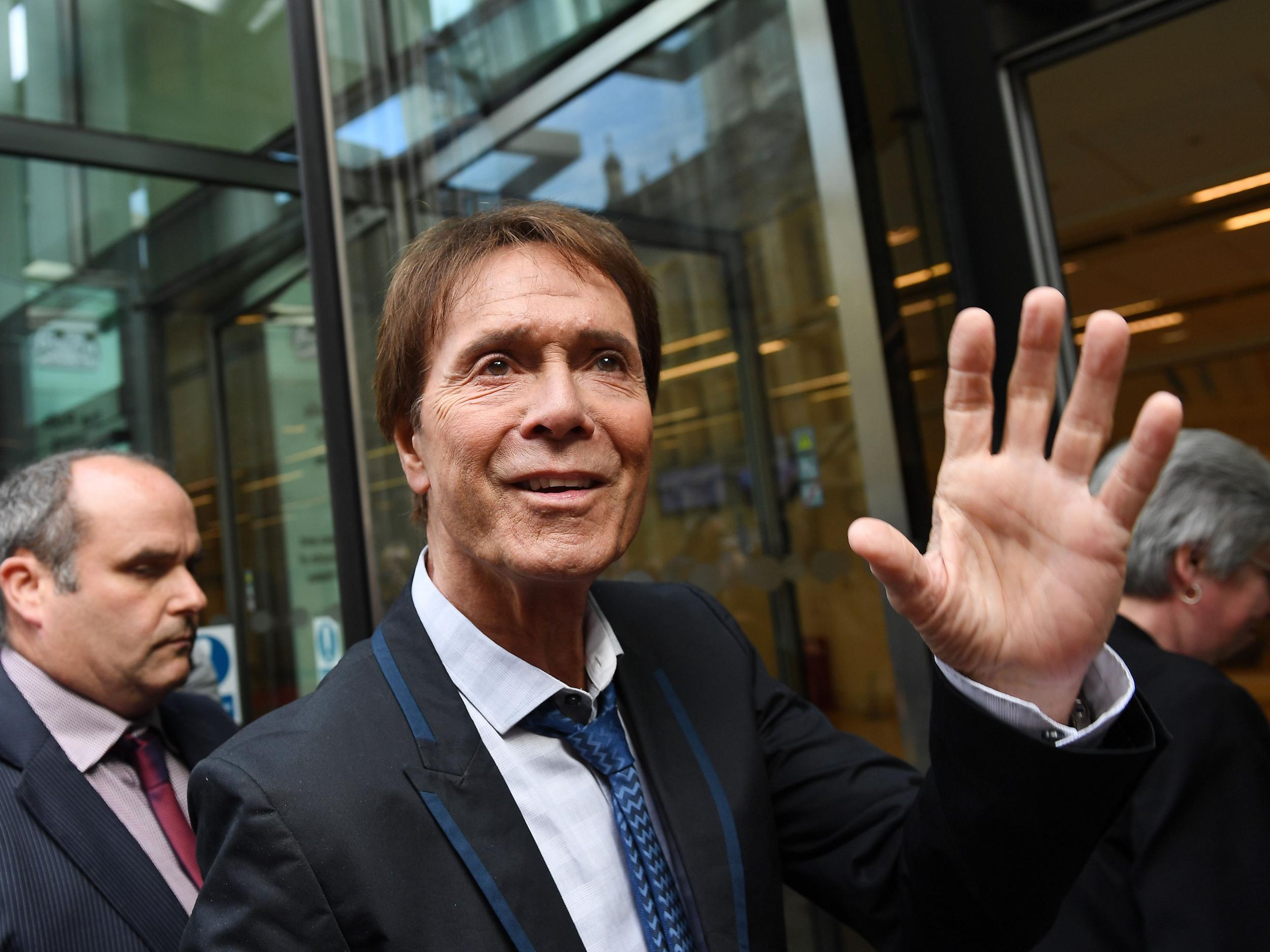Sir Cliff Richard wins privacy case against BBC over its coverage of police raid on his home
Broadcaster infringed star's rights in 'serious and sensationalist way', says judge

Your support helps us to tell the story
From reproductive rights to climate change to Big Tech, The Independent is on the ground when the story is developing. Whether it's investigating the financials of Elon Musk's pro-Trump PAC or producing our latest documentary, 'The A Word', which shines a light on the American women fighting for reproductive rights, we know how important it is to parse out the facts from the messaging.
At such a critical moment in US history, we need reporters on the ground. Your donation allows us to keep sending journalists to speak to both sides of the story.
The Independent is trusted by Americans across the entire political spectrum. And unlike many other quality news outlets, we choose not to lock Americans out of our reporting and analysis with paywalls. We believe quality journalism should be available to everyone, paid for by those who can afford it.
Your support makes all the difference.Sir Cliff Richard has won a privacy case in the High Court against the BBC over its coverage of a police raid on his home.
The 77-year-old singer took legal action against the broadcaster after it showed South Yorkshire Police search his house in Berkshire following a child sexual assault allegation in August 2014.
Awarding £210,000 in damages for the “general effect” of the broadcast on Sir Cliff, Mr Justice Mann said the BBC had infringed the star’s privacy rights in a “serious and sensationalist way”. The singer is entitled to recover further sums for the financial impact of the legal case at a later date, he added.
The BBC said the ruling was not ”compatible with liberty and press freedoms” and it was considering an appeal.
During a trial in April and May, Sir Cliff told the judge the BBC coverage, which involved the use of a helicopter, was a “very serious invasion” of his privacy.
But senior editors at the BBC said the coverage was accurate and had been broadcast in good faith.
In 2013, a man told the Metropolitan Police Sir Cliff had sexually assaulted him when he was a child during a 1985 event at Sheffield United’s Bramall Lane football stadium. The case was passed to South Yorkshire Police.
Sir Cliff denied the allegation and was never arrested and in June 2016 prosecutors announced he would face no charges.
The singer brought a claim against South Yorkshire Police and the force settled the matter and agreed to pay him £400,000.
A statement read by a spokesman for the singer outside the High Court after the ruling against the BBC said the impact of the case on Sir Cliff had been “profound”.
Despite the damages awarded him, “Sir Cliff’s motivation was not for personal gain, as he knew all along that he would be financially out of pocket no matter what,” the statement said.
“His aim has been to try to right a wrong and to ensure, as best he could, no other innocent person would have to endure what he went through.”
Before litigation, Sir Cliff had asked the BBC to apologise and would have been “reasonable” in his request for damages had the broadcaster done so, the statement continued.
Yet “not only did they refuse to apologise but they were defiant, repeatedly telling the world that this was public interest journalism when, as we know now, it was not,” said the spokesman.
The spokesman added, in light of the ruling: “Serious questions need to be asked about the BBC’s focus on preserving their exclusive story at the expense of Sir Cliff’s rights.”
Sir Cliff spoke outside the court only to say: “I can’t really answer too many questions at the moment. It’s going to take me a while to get over the whole emotional factor and so I hope you will forgive me.”
Responding to the judgment, the BBC said: “We are sorry for the distress that Sir Cliff has been through. We understand the very serious impact that this has had on him.
“We have thought long and hard about how we covered this story. On reflection, there are things we would have done differently, however the judge has ruled that the very naming of Sir Cliff was unlawful.
“So even had the BBC not used helicopter shots or run the story with less prominence, the judge would still have found that the story was unlawful; despite ruling that what we broadcast about the search was accurate.
“This judgment creates new case law and represents a dramatic shift against press freedom and the long standing ability of journalists to report on police investigations, which in some cases has led to further complainants coming forward.
“This impacts not just the BBC, but every media organisation. This isn’t just about reporting on individuals. It means police investigations, and searches of people’s homes, could go unreported and unscrutinised. It will make it harder to scrutinise the conduct of the police and we fear it will undermine the wider principle of the public’s right to know. It will put decision making in the hands of the police.
“We don’t believe this is compatible with liberty and press freedoms; something that has been at the heart of this country for generations.
“For all of these reasons there is a significant principle at stake. That is why the BBC is looking at an appeal.”
Additional reporting by Press Association
Join our commenting forum
Join thought-provoking conversations, follow other Independent readers and see their replies
Comments